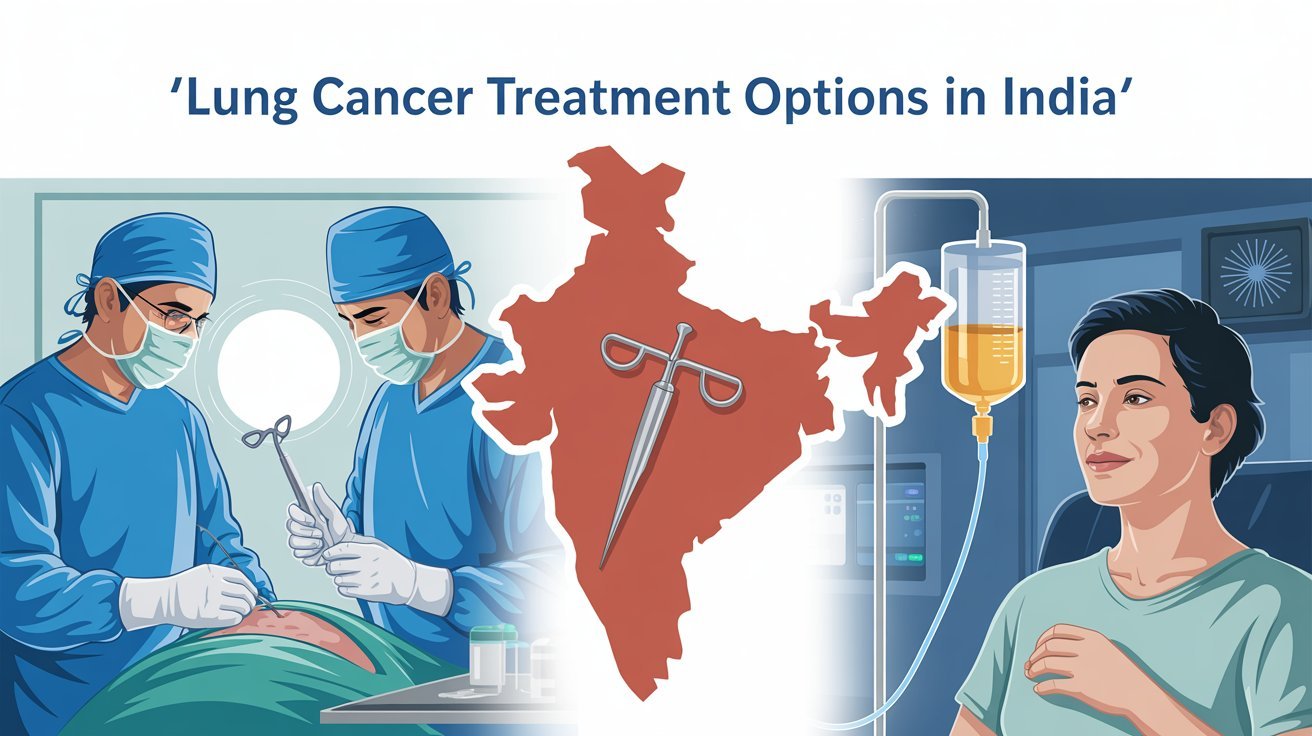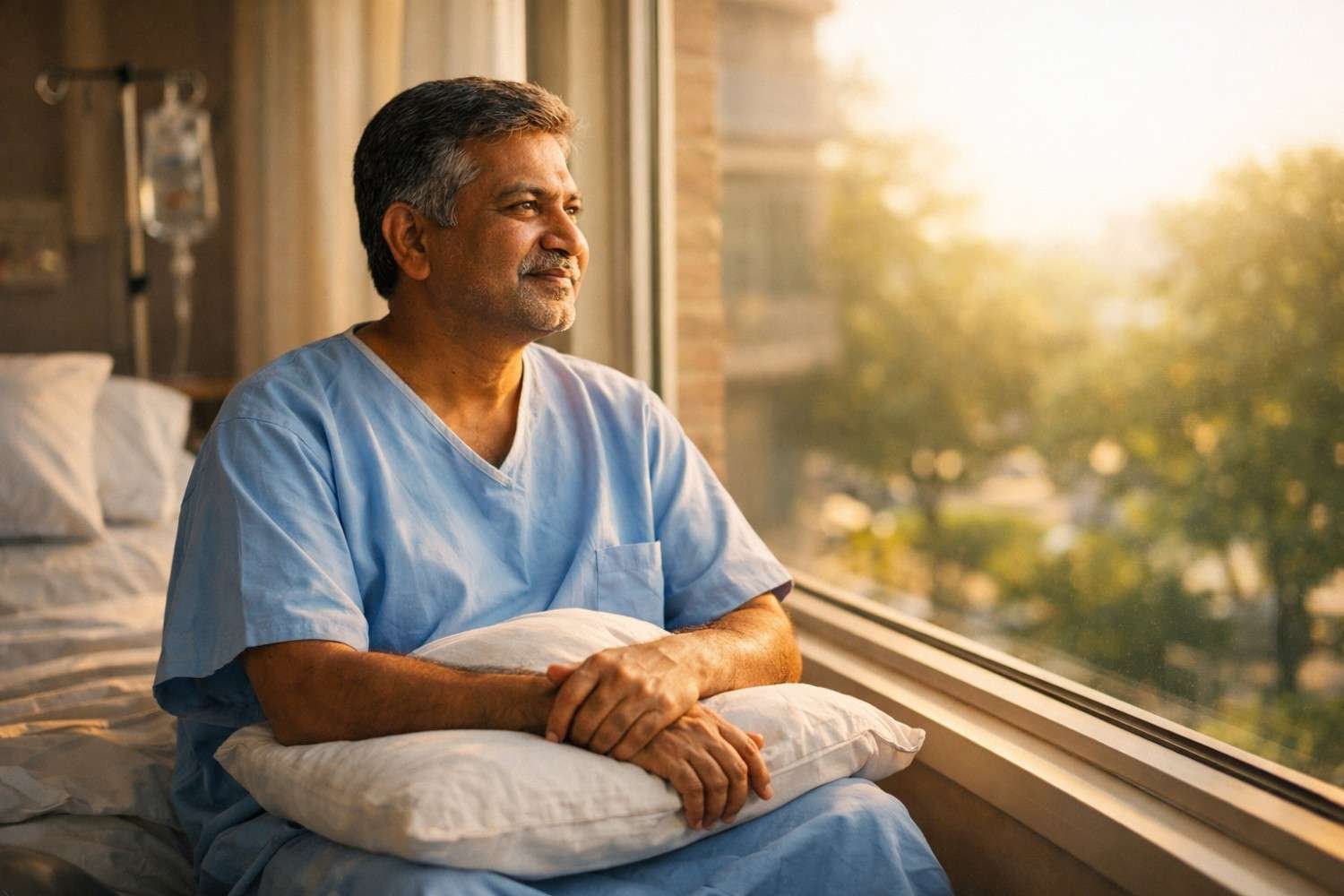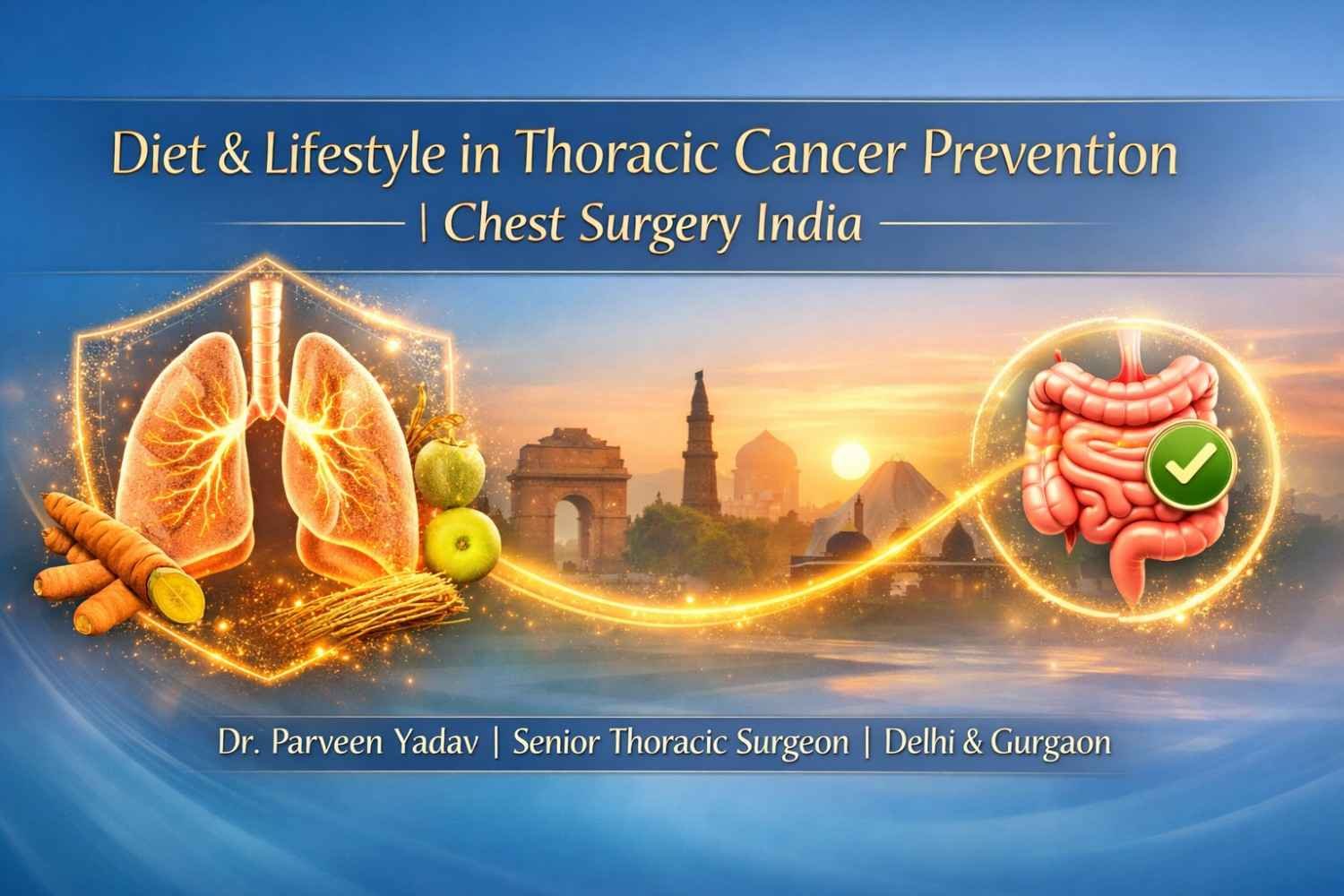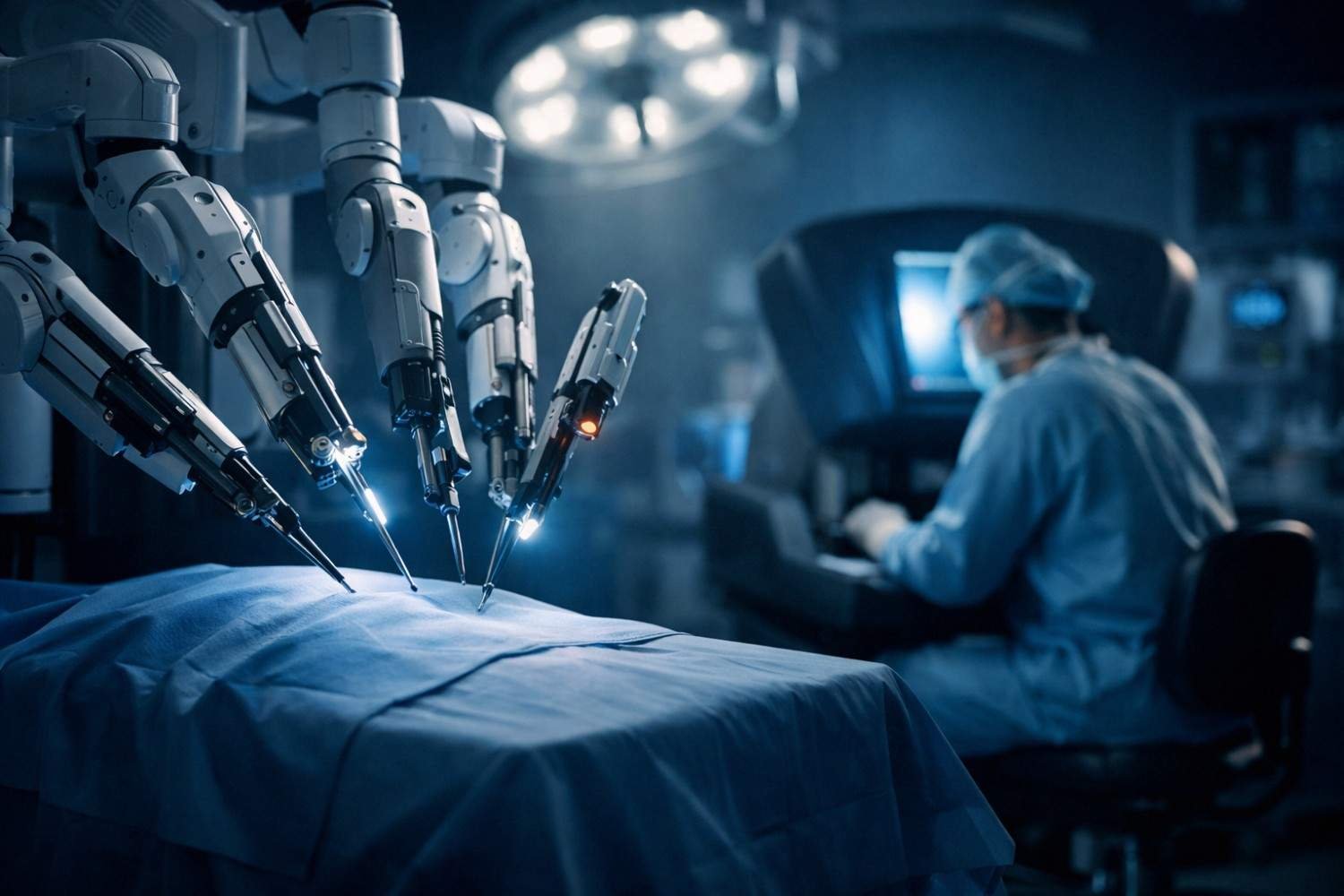

Lung cancer is one of the highest causes of cancer-related deaths in India, yet it's also one of the most treatable when diagnosed early. Over the years, I've consulted hundreds of patients who were overwhelmed by the question: "What's the best treatment path for me?" It's a question that doesn't have a one-size-fits-all answer—and that's where medical expertise, technology, and personalized care come into play.
As the senior chest surgeon at Chest Surgery India, Gurgaon, I've witnessed firsthand how the right combination of treatment—whether surgical or non-surgical—can drastically improve both survival rates and quality of life. With continuous advancements in cancer research, patients today have access to minimally invasive surgeries, cutting-edge immunotherapies, precision radiation, and highly targeted drug regimens.
However, with so many options now available, making the right choice can feel confusing and stressful.
In this blog, I'll walk you through a comprehensive overview of lung cancer treatment options in India. You'll learn the pros and cons of surgical vs. non-surgical therapies, when each is recommended, and how we at Chest Surgery India approach every case with a multidisciplinary, patient-first mindset.
Whether you're newly diagnosed, seeking a second opinion, or looking for advanced care options, this guide is designed to assist you make informed, confident decisions, backed by clinical evidence and compassionate care.
At Chest Surgery India, Gurgaon, we strongly believe that no two lung cancer cases are alike. Choosing the most effective treatment isn't just about diagnosing the disease—it's about understanding you as a patient. Your lifestyle, your health status, the stage of cancer, and even your genetic profile all play a crucial role in defining the best approach.
Here are the key factors that determine your lung cancer treatment options in India:
Your cancer's stage—ranging from Stage I to Stage IV—is perhaps the most critical factor in treatment planning.
Where the tumor is located in your lungs also matters:
We evaluate your physical fitness, lung capacity, and other health conditions such as diabetes, heart disease, or COPD. Patients with limited lung function might not be ideal candidates for major surgeries like lobectomy or pneumonectomy, and may benefit more from wedge resection or non-surgical treatments.
In modern lung cancer care, we don't just look at where the tumor is—we examine what drives it at the molecular level.
Finally, we respect your values, lifestyle goals, and social circumstances. Some patients prioritize aggressive treatment with curative intent, while others may seek quality of life, comfort, or palliative care. We support you in making choices that align with your priorities.
At Chest Surgery India, we conduct a tumor board review for every case, bringing together experts in thoracic surgery, medical oncology, radiation therapy, pulmonology, radiology, and pathology. This ensures that your treatment plan is not only clinically sound but also tailored specifically to your body, goals, and condition.
Whether you're eligible for robotic lung surgery, chemotherapy, or a hybrid treatment model, the decision will be backed by evidence, experience, and empathy.
Surgery remains one of the most effective and potentially curative options for early-stage lung cancer. At Chest Surgery India, Gurgaon, we specialize in advanced surgical techniques—including robotic-assisted procedures—that offer better precision, quicker recovery, and fewer complications.
Let's explore the main types of lung cancer surgeries available, along with their benefits, risks, and when they're most suitable.
What it is:
A lobectomy involves the removal of one of the five lobes of the lungs. It is the most common surgical treatment for patients with Stage I or II non-small cell lung cancer (NSCLC).
Why it's done:
When cancer is localized and has not spread to nearby lymph nodes, removing the affected lobe can lead to a 70–80% five-year survival rate.
Our Expertise:
What it is:
These are lung-sparing surgeries where only a small portion of the lung (either a wedge or an anatomical segment) is removed along with the tumor.
Why it's done:
Ideal for patients who:
Though not as definitive as lobectomy, segmentectomy can be curative for very early-stage cancers.
What it is:
Pneumonectomy involves the removal of an whole lung.
When it's recommended:
While this is a more aggressive surgery, it may be life-saving when no other curative options exist. At Chest Surgery India, we use advanced imaging and cardio-pulmonary evaluations to carefully assess a patient's suitability.
Hospital Stay:
Common Risks Include:
How We Minimize Risks:
Not every lung cancer patient is a candidate for surgery—and in many cases, non-surgical treatments play an equally important role, especially for advanced-stage, inoperable, or metastatic cancers. At Chest Surgery India, Gurgaon, we offer a full range of modern therapies that are tailored to each patient's diagnosis, cancer stage, and genetic profile.
Let's break down the key non-surgical treatment options available today.
What it is:
Chemotherapy concerns the use of cytotoxic drugs to kill rapidly growing cancer cells. It may be administered as a standalone treatment or combined with surgery or radiation.
When we use it:
Latest Advancements:
We utilize nanoparticle-based chemotherapy, which targets cancer cells more precisely while minimizing damage to healthy tissue—resulting in fewer side effects like hair loss and fatigue.
Common Drugs Used: Cisplatin, Carboplatin, Paclitaxel, Pemetrexed (depending on the cancer type and staging).
Radiation therapy uses high-energy beams to kill or shrink cancer cells. It's especially useful for:
Types Offered at Chest Surgery India:
Technology Used:
We operate the TrueBeam STx system, which allows for 30% fewer sessions, real-time imaging, and 99% targeting accuracy, ensuring both effectiveness and comfort.
What it is:
Targeted therapy focuses on specific genetic mutations that cause lung cancer, such as:
When we recommend it:
Patients with Stage III–IV non-small cell lung cancer who test positive for actionable mutations.
Benefits:
Common Drugs Used: Gefitinib, Osimertinib, Crizotinib, Alectinib
We conduct comprehensive molecular testing before starting treatment to identify the best personalized therapy.
What it is:
Immunotherapy enhances your immune system's ability to recognize and destroy cancer cells. It has become a game-changer in treating advanced or metastatic lung cancer.
When it's used:
Popular Drugs:
Advantages:
We use PD-L1 biomarker testing to determine eligibility before starting immunotherapy.
Palliative care is not about curing cancer—it's about improving quality of life for patients at any stage.
Services Include:
At Chest Surgery India, our palliative care team works alongside oncologists and surgeons to make sure patients feel supported, not just treated.
Whether used as a primary treatment or in combination with surgery, these therapies play a critical role in extending survival, reducing tumor burden, and improving day-to-day life for our patients. Our multidisciplinary team ensures every treatment plan is customized, evidence-based, and guided by compassion.
At Chest Surgery India, Gurgaon, we believe that the right treatment for lung cancer is never a general prescription—it's a personalized decision made after understanding your diagnosis, health status, and treatment goals. While surgery offers a potential cure for early-stage lung cancer, non-surgical therapies bring hope to those with advanced or inoperable cases.
Here's a direct comparison to help you understand how the two approaches differ:
| Factor | Surgical Treatment | Non-Surgical Therapies |
| Ideal Stage | Stage I–II (early-stage) | Stage III–IV, or inoperable tumors |
| Goal | Curative (remove tumor entirely) | Control tumor growth, relieve symptoms, or shrink tumor |
| Recovery Time | 2–6 weeks | Minimal physical recovery; effects vary by treatment |
| Invasiveness | Involves incisions and general anesthesia | Outpatient or infusion-based therapies |
| Side Effects | Pain, shortness of breath, surgical risks | Fatigue, nausea, low immunity, organ-specific toxicities |
| Cost in India | ₹3–8 lakhs (including hospitalization & robotic surgery) | ₹2–15 lakhs (varies by therapy type and cycles) |
| Technology Used | Da Vinci Xi Robot, VATS (minimally invasive) | TrueBeam STx, immunotherapy drugs, targeted agents |
| Hybrid Possibilities | Often combined with chemo or radiation for best outcomes | Can precede or follow surgery depending on case stage |
| Insurance Coverage | Yes (usually covered by major Indian health policies) | Yes (especially for chemo and targeted therapy) |
It depends entirely on:
For instance:
Many patients benefit from a combined treatment approach, where surgery is followed by chemotherapy or radiation to eliminate microscopic cancer cells, or where neoadjuvant therapy is used before surgery to shrink tumors.
This is why we adopt a multidisciplinary tumor board model at Chest Surgery India—to ensure every angle is considered before finalizing your roadmap.
Choosing a cancer treatment center is not just about technology or procedures—it's about trust, expertise, and outcomes that truly matter. At Chest Surgery India, Gurgaon, we bring together all the essential elements for world-class lung cancer care, delivered with compassion and precision.
Here's why hundreds of patients from across India and abroad trust us for their lung cancer treatment:
With over 18 years of surgical experience and 1,000+ successful lung procedures, Dr. Parveen Yadav is one of the few thoracic surgeons in India trained in both minimally invasive and robotic-assisted lung surgeries.
When you consult with Dr. Yadav, you're not just getting a diagnosis—you're getting a treatment strategy tailored to your biology, lifestyle, and long-term wellness.
We're proud to be among the first centers in India to offer robotic-assisted lung cancer surgery using the Da Vinci Xi System—a gold standard in thoracic procedures.
Benefits for You:
Lung cancer is a serious diagnosis, but today, more than ever, it is treatable—and in many cases, curable—when approached with the right combination of expertise, advanced treatment options, and compassionate care.
At Chest Surgery India, Gurgaon, we don't offer cookie-cutter solutions. Every patient receives a personalized treatment roadmap—crafted with precision, supported by the latest technology, and delivered by a team that truly cares about your well-being.
Whether you need robotic surgery, targeted drug therapy, radiation, or palliative support, you'll find it all under one roof, guided by multidisciplinary expertise and driven by results that matter.
If you're feeling uncertain about the next step, don't navigate this journey alone.

18+ Yrs Exp | 5,700+ Thoracic & Robotic Cancer Surgeries
Dr. Parveen Yadav is a Director and Senior Consultant in Thoracic and Surgical Oncology, specializing in minimally invasive and robotic lung and esophageal surgeries, with advanced training from AIIMS and Tata Memorial Hospital.
View Full Profile Pain After Thoracic Surgery: Tips for Smooth Recovery
Pain After Thoracic Surgery: Tips for Smooth Recovery
 Diet & Lifestyle for Thoracic Cancer Prevention | Dr. Parveen Yadav
Diet & Lifestyle for Thoracic Cancer Prevention | Dr. Parveen Yadav
 Robotic Thoracic Surgery: How Da Vinci Technology is Revolutionizing Chest Procedures
Robotic Thoracic Surgery: How Da Vinci Technology is Revolutionizing Chest Procedures
Struggling with pain after chest surgery? Dr. Parveen Yadav shares expert recovery tips, causes of shoulder pain, PTPS signs, and what your discharge sheet won't tell you.
Discover how diet, breathing exercises & daily habits help prevent and recover from thoracic cancer. Expert insights from Dr. Parveen Yadav, Chest Surgery India
Discover how Da Vinci robotic surgery is transforming chest procedures in Gurgaon. Less pain, faster recovery & expert care by a certified thoracic surgeon
Copyright 2026 © Dr .Parveen Yadav all rights reserved.
Proudly Scaled by Public Media Solution!